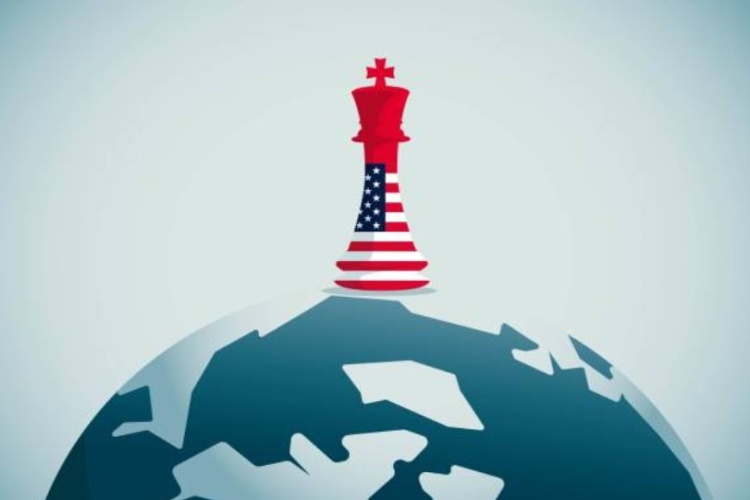
A superpower can withstand one shock; it is the accumulation of unforced errors that does lasting damage. The United States still commands extraordinary military, technological and financial strengths. Yet an erratic foreign policy — coupled with sweeping reciprocal tariffs — has begun to corrode the foundations of US hegemony: the confidence of allies, the habit of coalition, and the presumption that Washington is the system’s steady anchor. In a world tilting to multipolarity, the more severe risk to American power is not raw capacity but the collapse of trust that once multiplied it.
Hegemony has never been just about guns, GDP or the dollar. It rested on a trust premium: partners believed Washington would underwrite common rules, convene coalitions, and keep bargains. When that premium erodes, so does agenda-setting power. The current tariff-first posture taxes allies as readily as adversaries and is read abroad as a strategic turn inward. Independent analyses show these tariffs are paid largely by US firms and households—hardly a sign of confident leadership — and they invite retaliation that fragments supply chains once organised around the United States.
READ | Green steel transition tests industry, governments
Trump tariffs and allied confidence
Tariffs are being deployed not as narrow remedies but as doctrine. Partners in Europe and Asia, long accustomed to consultation before coercion, find themselves on the receiving end of blanket measures that blur friend and foe. India is emblematic: after three decades of careful courtship to balance China, higher US tariffs and steep visa fee hikes have chilled a pivotal corridor, forcing hurried damage control and emergency talks in Washington.
The message to allies is simple and corrosive: agreements are provisional; preferences are transactional; domestic politics outrank joint strategy. That is how trust decays. Once doubt sets in, partners hedge — signing side-deals, delaying investments, and seeking alternative patrons. The visible fraying of confidence — not any single tariff line — accelerates relative decline.
Inconsistent foreign policy and the loss of convening power
Allies also judge consistency. Washington’s withdrawals from global compacts — most notably the renewed process to exit the World Health Organisation and to halt engagement on pandemic rules — signal a retreat from underwriting public goods that magnified US influence at low cost. Health security, climate cooperation and crisis response were arenas where American convening power once set the tempo. Backing away cedes voice and venue to others.
Great-power competition, done well, relies on “allied scale” — pooling the economic, technological and military heft of like-minded partners to offset a rival’s sheer size. The United States’ decisive advantage lies in coalition capacity, not solo power. When tariffs hit allies and treaties are abandoned, the arithmetic of allied scale no longer adds up.
China’s scale and the shrinking margin for error
The costs of inconsistency rise because the competitor is not standing still. China now fields the world’s largest navy by number of battle-force ships — a fact that tangibly shifts deterrence calculations in the Indo-Pacific and forces partners to plan for US absence, not assurance.
In the clean-tech backbone of industrial policy — batteries and upstream minerals — China produces well over three-quarters of global cells and leads critical segments of the supply chain. Price and scale advantages are widening, not narrowing, as 2024–25 data show. When Washington levies broad tariffs while offering a volatile policy signal, firms in Europe, Southeast Asia and Africa adjust — often toward Chinese input providers and financiers — because the market certainty is on the other side.
Fractured coalitions and a multipolar reality
Hegemony diffuses when coalitions thin. Europe, wary of over-dependence on China but faced with industrial facts, is hedging—pressing its own defensive tools while leaving doors ajar to Chinese capital, equipment and markets. In Africa, the race for critical minerals and infrastructure finance has already tilted toward Beijing; tariff shocks that hit developing country exporters only reinforce the pivot. Each defection is small. The sum total is large: fewer votes at international bodies, slower uptake of U.S. standards, and less willingness to align on sanctions or export controls when Washington asks.
The symbolic blows matter too. Allies watched the United States oscillate between maximalist rhetoric and minimal consultation on Ukraine endgames or Middle East escalations, and then saw policy improvisations on issues as sensitive as Afghanistan basing publicly swatted away. Each episode feeds a narrative of unpredictability—hard to plan around and harder still to rally behind.
What does the balance sheet look like
Agenda-setting power declines. Standards for the next economy—AI, data flows, green industry — are negotiated in forums where US leverage depends on like-minded blocs. If the bloc doubts Washington’s steadiness, rules drift or fragment.
Dollar and sanctions leverage face friction. Financial statecraft is most potent when allies move in concert. Policy whiplash forces partners to seek carve-outs or alternative channels, dulling the edge of US tools over time.
Supply-chain leadership splinters. Tariffs that act as a broad tax push firms to diversify around the United States, not into it; promised reshoring tilts toward automation rather than jobs, muting domestic gains while prices rise.
Reassurance premiums rise. Allies require more deployments, more guarantees, more subsidies to do what used to come cheaply—align with Washington’s preferences.
The decline of US hegemony
Decline is not an event; it is a slope steepened by choices. Tariffs as organising principle and inconsistency as operating method teach allies the wrong lesson: that US commitments are contingent and coalitions disposable. China’s scale exploits that vacuum, presenting itself as the reliable manufacturer, the patient investor, the steady buyer. The net effect is a quiet transfer of influence: votes, standards, contracts, basing rights, and crisis management all move a step away from Washington.
The United States still has the assets to lead—technology clusters, capital markets, a network of democratic partners, and unmatched military reach. But hegemony rests on something less tangible and more fragile: trust that America will show up, keep its word, and treat allies as multipliers, not marks. Lose that, and even overwhelming resources feel insufficient. Preserve it, and relative decline becomes manageable. In the present trajectory, the trust premium is evaporating — and with it, the easy presumption of US dominance.
Anil Nair is Founder and Editor, Policy Circle.

